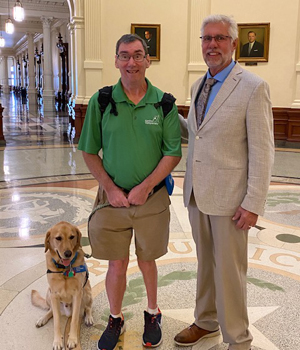Texas Law Seeks To Muzzle Use Of Fake Service Animals

L-R Austin, James Carter, and Lynn Stucky
Texas lawmakers have passed a new law aiming to curb the misuse of service animal privileges. House Bill 4164, which went into effect Sept. 1, 2023, addresses a problem that has plagued the state for years: pet owners misrepresenting their untrained animals as legitimate service dogs.
Such animals have the potential to disrupt places of business and violate health codes in food service areas. Even worse, they distract legitimate service dogs with their unpredictable behavior and sometimes exhibit aggression toward them, leading to anxiety, injury, or possibly death.
Voicing his support for the new law, State Representative Dr. Lynn Stucky(R- Denton) and veterinarian remarked, “It is very important that we make sure untrained and in some cases aggressive, uncontrollable dogs are not allowed to get the ‘service dog’ status creating problems for legitimate service animals, their owners, and causing problems for businesses.”
Kathy Taylor still has not gotten over the day her service dog was attacked by a pet dog wearing a service-animal vest. She was vacationing in Scottsdale, Arizona, at the time, many hours away from her home in Nashville, Tennessee, and had to rush her dog, Miss Janet, to an emergency vet for surgery to treat brutal injuries to its hind quarters. Recovery took months.
“Service dog fraud and misrepresentation of untrained pets is not a victimless crime,” emphasized Wallis Brozman, communications and advocacy coordinator for Canine Companions, a nonprofit service dog provider. “There are real consequences for people with disabilities who need task-trained service dogs for independence, from lack of public access to the potential for career-ending physical attacks. It is our hope that Texas HB 4164 will reduce the impacts of these untrained dogs, while raising awareness about the important roles of service dogs.”
Under the law authored by Rep. Phillip Cortez (D-San Antonio), it is now a misdemeanor offense to intentionally misrepresent an animal as a service dog, with penalties ranging from fines up to $1,000 and 30 hours of community service. The legislation primarily seeks to safeguard the rights of individuals with disabilities who rely on the assistance of bona fide service animals.
“These service dogs love their job and go through years of training and tens of thousands of dollars to earn the right to work in public, and to have that honor stripped from them due to someone wanting to bring their pet into a grocery store or other public environment that is not pet friendly is a disgrace to the service dog and the handler who waited years for said dog and needs this dog as medical equipment to live life independently,” said Elizabeth Brownen, a service dog handler and volunteer with Canine Companions.
To comprehend the significance of this law, it is essential to understand the role of the Americans with Disabilities Act. The ADA mandates that service animals, defined as dogs (and sometimes miniature horses) trained to perform specific tasks for individuals with disabilities, be granted access to public spaces, including restaurants, hotels, and stores. These animals play a crucial role in facilitating independence and improving quality of life for their handlers.
While the intentions behind the new law are commendable, some question its practical effectiveness. One key concern lies in the enforcement of the legislation.
Without a reliable system to distinguish genuine service dogs from impostors, the burden of proof may fall on business owners and proprietors, potentially leading to confusion and, in some cases, unintended discrimination against individuals with legitimate service animals.
To address the challenges of enforcement, the Texas law empowers business owners to ask two questions when encountering an individual who claims to be accompanied by a service animal:
1. “Is this dog a service animal required because of a disability?”
2. “What task or work has the dog been trained to perform?”
Business owners are prohibited from requesting any documentation or certification for the dog, as such paperwork is not required under federal law.
Brownen contended that the two ADA questions are good indicators for determining whether a dog is a legitimate service animal.
“Where I think businesses fail is not asking the questions in the first place, not enforcing when they recognize a fake, and not understanding the second question stating, ‘What tasks does your dog perform,’” she said. “Many businesses don’t understand that ‘emotional support,’ which is a very common answer fake handlers give, is not a real task.”
Brownen thus advocated for mandatory education for businesses and schoolchildren about the ADA laws and disabilities.

L-R State Reprehensive Dr. Lynn Stucky (R-Denton), Handler James Carter, and Austin the Service Dog. In Austin, Texas outside the Capitol Building
“I have had so many businesses tell me that they are uncomfortable asking the two ADA questions to people because some fake service dog handlers have threatened to call corporate or sue the business,” Brownen said. “This is where many fake handlers threaten to sue a business for a HIPAA violation because they themselves do not understand that the business is not asking about their ‘disability’ but about what the dog is trained to do. Real service dog handlers have no problem answering these questions, and in my experience I am ecstatic to answer them because I feel as if the business is doing the right thing and it makes me feel more comfortable to shop there.”
Unlike previous legislation, the new Texas law not only establishes penalties for misrepresenting service animals but also aims to educate the public about the rights and responsibilities associated with legitimate service animals. By promoting awareness, the hope is that individuals will better understand the importance of respecting the integrity of service dogs and their handlers while curbing the misuse of these privileges.
The impact of the new law remains uncertain. Some experts argue that a more comprehensive approach, involving better education, standardized training, and certification for service animals, could be the key to addressing the issue more effectively. They note that striking a balance between preserving the rights of individuals with disabilities and preventing the misuse of service animal privileges is a complex task, requiring collaboration between lawmakers, disability rights advocates, and business owners.
One thing is certain: observers nationwide will be watching with keen interest to see whether this new law successfully curbs the use of fake service dogs while simultaneously ensuring accessibility and supporting the genuine needs of individuals with disabilities.



